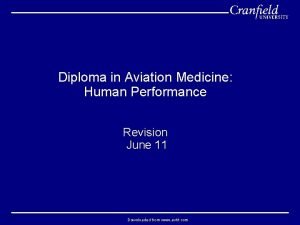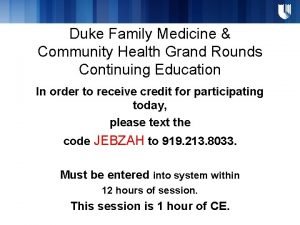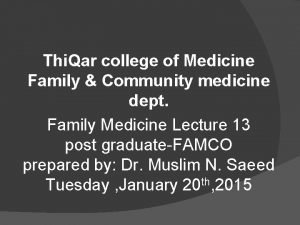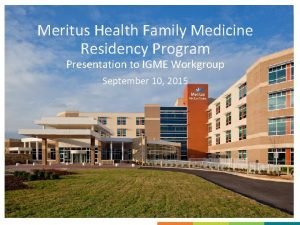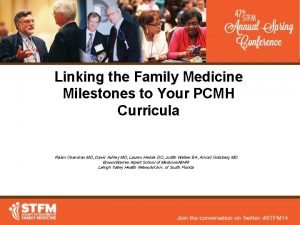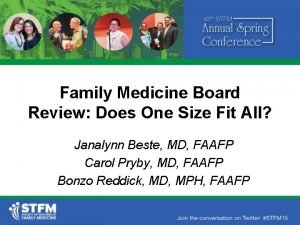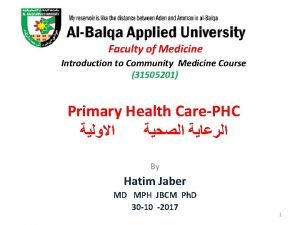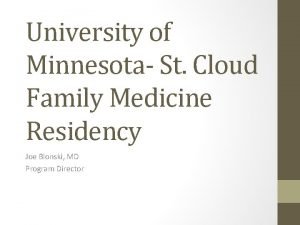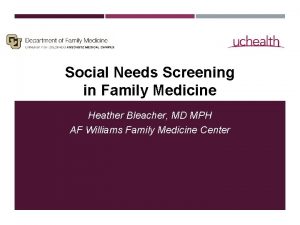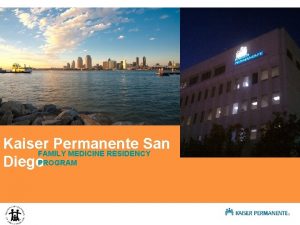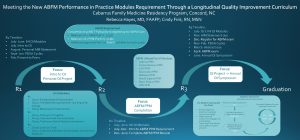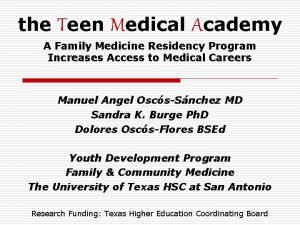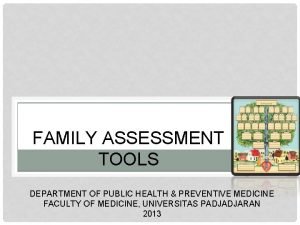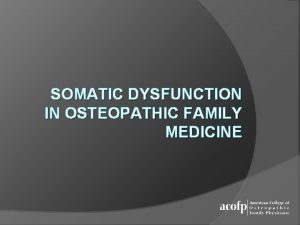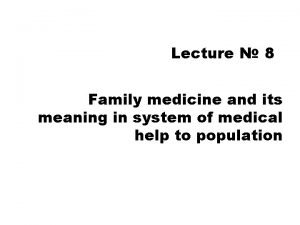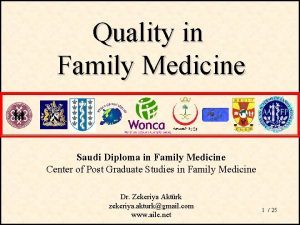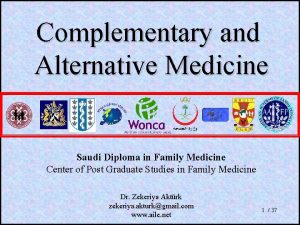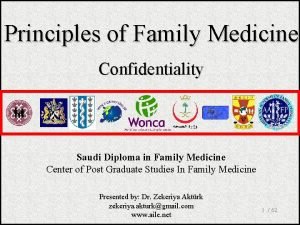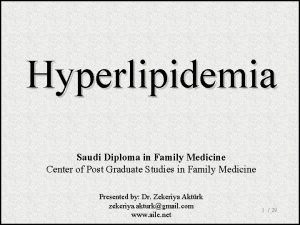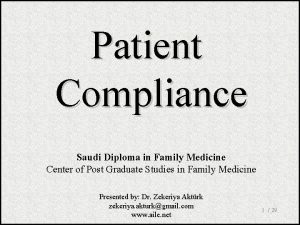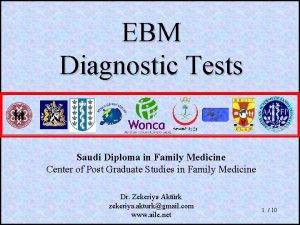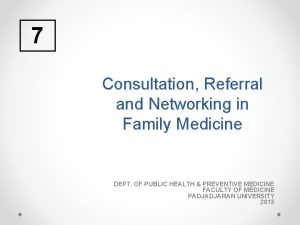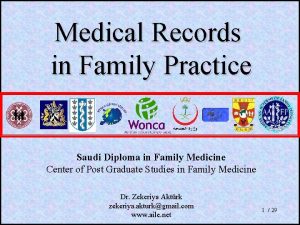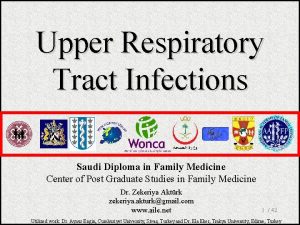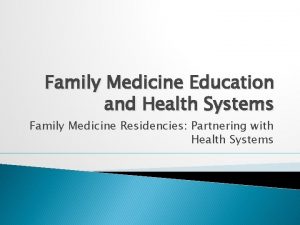Consultation and Referral in Family Medicine Saudi Diploma




























- Slides: 28

Consultation and Referral in Family Medicine Saudi Diploma in Family Medicine Center of Post Graduate Studies in Family Medicine Dr. Zekeriya Aktürk zekeriya. akturk@gmail. com www. aile. net 1 / 28

Aim-Objectives • Aim: At the end of this session, the participants will be aware of the coordinating role of the primary care physician and they will have knowledge on the principles of referral and consultation. • Objectives: – – – – Can describe referral Can describe consultation Advocate team work in patient management Knows the importance of under and overreferral Can tell the most common reasons for referral Can explain the referral process Is aware of the importance of communication in referral and consultations 2 / 28

Definition of primary care • The professional role is applied either directly or through the services of others according to health needs and the resources available within the community they serve, assisting patients where necessary in accessing these services. Wonca Europe 2002 3 / 28

Definitions • Consultation – involves another physician performing a specific diagnostic or therapeutic task, without transfer of responsibility for the patient's care or even for ongoing management of the problem. • Referral, – on the other hand, involves sending a patient to another physician for ongoing management of a specific problem with the expectation that the patient will continue to see the original physician for coordination of total care. Paul A. Nutting, Peter Franks, Carolyn M. Clancy. Referral and consultation in primary care: 4 / 28 do we understand what we're doing? – Editorial. Journal of Family Practice, July, 1992

Is it important? • For each dollar generated by a family physician, $2 are generated by the consultant physician, and $4 by the associated hospital • Consultations may increase the cost of care while they increase the quality of care. Glenn JK, Lawler FH, Hoerl MS. Physician referrals in a competitive environment. , An estimate of the economic impact of a referral. JAMA 1987; 258: 1920 -3. 5 / 28

From patient side • Appropriate consultation and referral may lead to prompt diagnosis and treatment of conditions that were beyond the immediate expertise of the primary care physician. • Inappropriate referral, however, may lead to unnecessary testing and a cascade of increasingly expensive, invasive, and risky procedures in an often futile search for diagnostic certainty. Mold JW, Stein HF. The cascade effect in the clinical care of patients. N Engl J Med 1986; 314: 512 -4 6 / 28

Experienced physicians refer more! • Physicians with greater expertise had higher referral rates • Why? – Curious to learn? – No toleration for uncertainty? Reynolds GA, Chitnis JG, Roland MO. General practitioner outpatient referrals: do good doctors refer more patients to hospital? Br Med J 1991; 302: 1250 -2 7 / 28

The place of uncertainty • Physicians who are willing to tolerate more uncertainty generate less intense services, including laboratory testing and referral. Holtgrave DR, Lawler F, Spann SJ. Physicians' risk attitudes, laboratory usage, and referral decisions: the case of an academic family practice center. Med Decis Making 1991; 11: 12530. Grol R, Whitfield M, De Maeseneer J, Mokkink H. Attitudes to risk taking in medical decision making among British, Dutch and Belgian general practitioners [see comments]. Br J Gen Pract 1990; 40: 134 -6. 8 / 28

The spectrum between consultation and referral Informal consultation (“Sidewalk consultation”) Transfer of full responsibility (End stage renal disease) 9 / 28

Factors affecting referrals • • Availability of qualified consultants Patient characteristics Physician specialty Length of training, Reimbursement plan Quality of referrals (NS) Unexplained ? ? 10 / 28

Reasons for Referrals • • To establish the diagnosis. For a specified investigation; e. g, colonoscopy. For treatment or surgery; for example, cholecystectomy. For advice on management (rheumatoid arthritis treatment). For a specialist to take over management; e. g dialysis for renal failure. For a second opinion: reassure you all you have done is necessary. For a second opinion: reassure the patient or the family that you have done all that is necessary (patient request). • Medical-legal concerns by the physician, the patient, or both. • An opportunity for physician education. • Organizational requirement for a second opinion by an insurance company, residency program, or hospital policy 11 / 28 Coulter A, Noone A, Goldacre M. General practitioners referrals to specialist outpatient clinics: why general practitioners refer patients to specialists outpatient clinics. BMJ 1989; 299: 304 -8.

Dowie's work • Professional attributes, • Knowledge of the health care system, • Personal style. Dowie R. General practitioners and consultants: a study of outpatient referrals. London: King's Fund, 1983. 12 / 28

• Both underreferral and overreferral may be prevalent. Both have significant cost and outcomes implications !! 13 / 28

Consultation and referral strategies (1) primary care physician and the patient recognize the need for consultation and referral; (2) primary care physician communicates the reason for the consultation and referral along with relevant clinical information to the specialist; (3) the specialist evaluates the patient's condition; (4) the specialist communicates the findings and recommendations to the primary care physician; and (5) the patient, primary care physician, and specialist understanding their responsibilities for continuing care Mc. Phee SJ, Lo B, Saika GY, Meltzer R. How good is communication between primary care physicians and subspecialty consultants? Arch Intern Med 198; 144: 1265 -8. 14 / 28

• Problems can arise at any step but • many of the problems are attributed to failures in communication and discordant expectations !! 15 / 28

Referral/consultation rates • Referring/consulting 3 -12 percent of all office visits is considered to be OK • Claire (USA): 5. 97 per 100 office visits. Claire Bourguet, Valerie Gilchrist, Gary Mc. Cord. The consultation and referral process: a report from NEON - Northeastern Ohio Network. Journal of Family Practice, Jan, 1998 16 / 28

• Female physicians (6%) are more likely than male physicians (1%) to indicate that the patient had requested the referral !! Claire Bourguet, Valerie Gilchrist, Gary Mc. Cord. The consultation and referral process: a report from NEON - Northeastern Ohio Network. Journal of Family Practice, Jan, 1998 17 / 28

New vs. old problems • New problems – 9 times as likely to be referred at patient request (5. 4% of new problems compared with 0. 6% of old problems). • Old problems – 3 times as likely to be referred for advice on management (18. 7% of old problems compared with 6. 3% of new problems) Claire Bourguet, Valerie Gilchrist, Gary Mc. Cord. The consultation and referral process: a report from NEON - Northeastern Ohio Network. Journal of Family Practice, Jan, 1998 18 / 28

Commonly referred areas • • • • No. (%) Surgery 48 (15. 7) Gastroenterology 27 (8. 8) Ophthalmology 23 (7. 5) Physical Therapy 23 (7. 5) OB/GYN 21 (6. 9) Orthopedics 22 (7. 2) Cardiology 17 (5. 6) Psychology/Behavioral Science 14 (4. 6) Ear/Nose/Throat 12 (3. 9) Dermatology 10 (3. 3) Psychiatry 7 (2. 3) Pediatrics 5 (1. 6) Other physician 36 (11. 8) Other nonphysician 41 (13. 4) Total 306 Rate x 100 Office Visits 0. 93 0. 52 0. 44 0. 41 0. 43 0. 33 0. 27 0. 23 0. 19 0. 14 0. 10 0. 79 5. 97 Claire Bourguet, Valerie Gilchrist, Gary Mc. Cord. The consultation and referral process: a report from NEON - Northeastern Ohio Network. Journal of Family Practice, Jan, 1998 19 / 28

Does the consultation happen? • Percentage of patients who fail to see the consultant range from 3% to 18% • Why? Claire Bourguet, Valerie Gilchrist, Gary Mc. Cord. The consultation and referral process: a report from NEON - Northeastern Ohio Network. Journal of Family Practice, Jan, 1998 20 / 28

Feedback from the consultant • Referring physicians receive verbal or written feedback from the consultant 26% to 80% of the time. • There is a higher probability of receiving feedback from a physician in private practice than a physician in academic practice !! Hansen JP, Brown SE, Sullivan RJ, Muhlbaier LH. Factors related to an effective referral and consultation process. J Fam Pract 1982; 15: 651 -6. 21 / 28

• There is evidence that a prior communication from the referring physician increases the probability of feedback from the consultant !! Hansen JP, Brown SE, Sullivan RJ, Muhlbaier LH. Factors related to an effective referral and consultation process. J Fam Pract 1982; 15: 651 -6. 22 / 28

• A report from the consultant is more likely if a follow-up letter is specifically requested, or • if the patient's diagnosis or medication has been changed by the consultant. Haikio P-J, Linden K, Kvist M, Outcomes of referrals from general practice. Scand J Prim Health Care 1995; 13: 287 -93. 23 / 28

Suggestions • Carefully explore with your patients the reasons for and the expectations from the consultation in order to improve patient attendance. 24 / 28

Suggestions • There is good evidence that the behavior of the referring physician can influence the behavior of the consultant. Communication from the referring physician will increase the probability of feedback from the specialist and this will result in a short-term outcome of increased physician satisfaction with the referral. 25 / 28

Suggestions • Don’t hesitate to mobilize the health resources for your patient ! • But also don’t forget that as the chef of the orchestra YOU have to take care of the efficient use of the country resources ! 26 / 28

Suggestions • The use of computer and communications technology may provide opportunities to facilitate the consultation process. Use them if available. 27 / 28

Suggestions • Prepare a written request (a letter) for the consultant including patient data, the reason for referral, a summary of the findings so far, and your expectations. 28 / 28
 Early help assessment training
Early help assessment training Diploma in aviation medicine
Diploma in aviation medicine Diploma in reproductive medicine
Diploma in reproductive medicine Compare and contrast israel saudi arabia and turkey
Compare and contrast israel saudi arabia and turkey Duke medicine grand rounds
Duke medicine grand rounds Saudi standards, metrology and quality organization
Saudi standards, metrology and quality organization Types of family in community medicine
Types of family in community medicine Principles of family medicine
Principles of family medicine Halifax family medicine residency
Halifax family medicine residency Meritus medical center family medicine residency
Meritus medical center family medicine residency Family medicine fellowship
Family medicine fellowship Milestones family medicine
Milestones family medicine Family medicine boards review
Family medicine boards review Types of family in community medicine
Types of family in community medicine Definition of family medicine
Definition of family medicine Surgery nbme percentiles
Surgery nbme percentiles Family ecomap example
Family ecomap example St cloud family medicine residency
St cloud family medicine residency Af williams family medicine center
Af williams family medicine center Kaiser permanente san diego family medicine residency
Kaiser permanente san diego family medicine residency Family medicine in ethiopia
Family medicine in ethiopia Cabarrus family medicine concord nc
Cabarrus family medicine concord nc Uthscsa internal medicine residents
Uthscsa internal medicine residents St louis university family medicine residency
St louis university family medicine residency Apgar family assessment tool
Apgar family assessment tool Dr riaz qureshi
Dr riaz qureshi Isu family medicine
Isu family medicine Somatic dysfunction in osteopathic family medicine
Somatic dysfunction in osteopathic family medicine Family medicine meaning
Family medicine meaning

